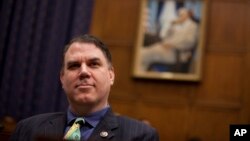A U.S. congressman has asked the Obama administration to impose an immediate travel ban on the citizens of Guinea, Liberia and Sierra Leone, as well as on foreigners who have visited those countries, to contain the spread of Ebola to the United States.
Congressman Alan Grayson of Florida, a member of the House of Representatives Committee on Foreign Affairs, said the restriction should be lifted only when 90 days have passed without a newly reported case.
He said the ban should be expanded to any other country that reports a case of Ebola.
Danger to American public
Grayson said the Ebola virus presents an enhanced danger to the American public.
“The countries represent a danger to the rest of the world and because the best way to deal with the situation is to isolate the areas that are affected until hopefully the infection burns itself out, as it has in the past," Grayson said. "We are talking about this time a fundamentally different circumstance, however.
"This is the largest outbreak in history; it’s the deadliest outbreak in history,” he added.
Grayson said, with Liberia already taking steps to close its borders, his travel ban request will only be assisting in that effort by saying that the Ebola-affected countries remain isolated until the infection disappears.
He said his travel ban, if granted by the Obama administration, would not include Nigeria, at least for now.
“Under the definition set forth in my letter, not yet, because the only case we’ve seen so far in Nigeria is the case that originated in Liberia," Grayson said. "So, there hasn’t been, as yet, any case that originated in Nigeria or anywhere other than the three countries I named in the letter – Guinea, Sierra Leone, and Liberia."
The U.S. Peace Corps announced Wednesday it was temporarily removing its volunteers from Liberia, Sierra Leone and Guinea due to the increasing spread of the Ebola virus.
Returning Americans
Grayson said the travel ban he’s requesting would only apply to foreign visitors to the United States and not Americans returning from abroad.
“If they are Americans, then we’re expecting that, when they return, they’ll take prudent measures," he said.
"There are ways that can be employed to try to identify people who have been infected, and I would hope that they will voluntarily and enthusiastically submit themselves to those tests so that we can make sure that, if they are returning, they’re not returning with disease,” Grayson said.
The World Health Organization recently said nearly 700 people have died from Ebola in Guinea, Liberia and Sierra Leone during the current outbreak of the virus that began in February.
There is no vaccine or cure for Ebola, which is characterized by fever, vomiting, diarrhea, body aches, and unstoppable bleeding from areas such as the eyes, ears and nose.




